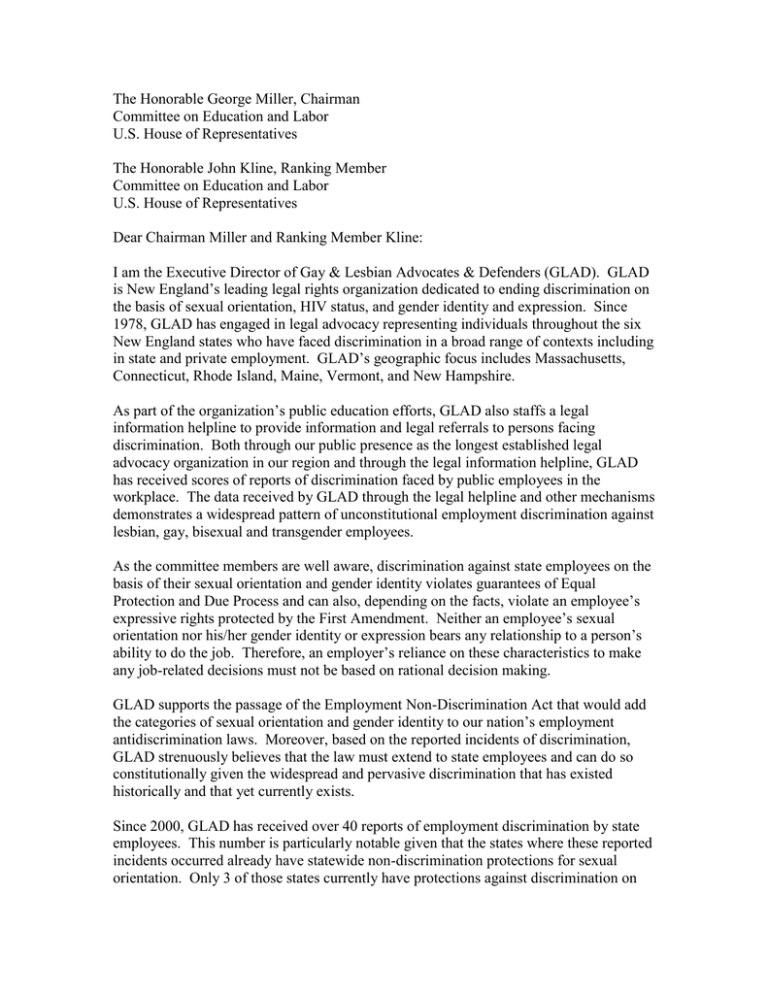The Honorable George Miller, Chairman Committee on Education and Labor
advertisement

The Honorable George Miller, Chairman Committee on Education and Labor U.S. House of Representatives The Honorable John Kline, Ranking Member Committee on Education and Labor U.S. House of Representatives Dear Chairman Miller and Ranking Member Kline: I am the Executive Director of Gay & Lesbian Advocates & Defenders (GLAD). GLAD is New England’s leading legal rights organization dedicated to ending discrimination on the basis of sexual orientation, HIV status, and gender identity and expression. Since 1978, GLAD has engaged in legal advocacy representing individuals throughout the six New England states who have faced discrimination in a broad range of contexts including in state and private employment. GLAD’s geographic focus includes Massachusetts, Connecticut, Rhode Island, Maine, Vermont, and New Hampshire. As part of the organization’s public education efforts, GLAD also staffs a legal information helpline to provide information and legal referrals to persons facing discrimination. Both through our public presence as the longest established legal advocacy organization in our region and through the legal information helpline, GLAD has received scores of reports of discrimination faced by public employees in the workplace. The data received by GLAD through the legal helpline and other mechanisms demonstrates a widespread pattern of unconstitutional employment discrimination against lesbian, gay, bisexual and transgender employees. As the committee members are well aware, discrimination against state employees on the basis of their sexual orientation and gender identity violates guarantees of Equal Protection and Due Process and can also, depending on the facts, violate an employee’s expressive rights protected by the First Amendment. Neither an employee’s sexual orientation nor his/her gender identity or expression bears any relationship to a person’s ability to do the job. Therefore, an employer’s reliance on these characteristics to make any job-related decisions must not be based on rational decision making. GLAD supports the passage of the Employment Non-Discrimination Act that would add the categories of sexual orientation and gender identity to our nation’s employment antidiscrimination laws. Moreover, based on the reported incidents of discrimination, GLAD strenuously believes that the law must extend to state employees and can do so constitutionally given the widespread and pervasive discrimination that has existed historically and that yet currently exists. Since 2000, GLAD has received over 40 reports of employment discrimination by state employees. This number is particularly notable given that the states where these reported incidents occurred already have statewide non-discrimination protections for sexual orientation. Only 3 of those states currently have protections against discrimination on the basis of gender identity (Vermont, Rhode Island, and Maine). I have attached a compilation of these reported incidents that provides detailed, alleged facts about the reported incidents as well as the state and government agency that employed the individual. The complaints of discrimination received by GLAD vary in type but range from outright adverse employment decisions because of an employee’s sexual orientation or gender identity to harassment by supervisors to harassment by co-workers which many times remains unaddressed by superiors despite multiple incidents of reporting by the victim. The following reflects a small sample of the calls we have received. A caller reported that she was one of seven lesbians terminated by a state social service agency. Another reported that she was one of two lesbian public school teachers whose contract was not renewed because of the principal’s difference with her (and the other teacher’s) “philosophies.” In one case that received a fair bit of public attention, GLAD represented a transgender police officer in Vermont who was run off the force by supervisors and coworkers after they learned (from an internet search) that he was transgender. On several occasions, he was given faulty equipment, inaccurate directions, and denied training opportunities without explanation. The officer had been a highly decorated police officer in another state before moving to Vermont and joining a local police force. He was eventually told by the town’s former police chief that the reason for the discriminatory treatment was the fact of his being transgender. I have no doubt that this compilation represents just a fraction of the incidents of discrimination that state employees face in the six New England states in which GLAD focuses its advocacy. This underreporting exists for numerous reasons including the risks that employees take in bringing a complaint which would necessarily disclose the person’s sexual orientation and/or gender identity to an even broader range of co-workers and decision maker. In addition, even when employees are willing to expose themselves to such risk, they often face hostile or uninformed state agencies and courts. For example, an openly gay staff member at a Massachusetts state agency was repeatedly harassed by one of his co-workers. The co-worker posted and distributed anti-gay news articles and made anti-gay remarks in front of the gay employee. The gay staff member complained to his supervisor about the harassment. The supervisor took no steps to address the offending conduct. In a similar type of case, a gay janitor in a Massachusetts public school district faced severe and repeated harassment including a physical assault that was captured on videotape. Despite complaints filed by the employee, the school district took no steps to terminate the harassment. In yet another case, a gay public school teacher reported multiple incidents of harassment, including being called “faggot,” and having his e-mail address posted to lewd websites, to school administrators. Shortly after reporting the harassment, the school superintendent told the teacher that his position was being restructured and he was being terminated. The absence of explicit federal protections and remedies seriously impacts the willingness of employees to pursue available remedies and results in widespread underreporting of incidents of workplace discrimination. For all of the reasons stated above, GLAD urges support and passage of ENDA. The need for explicit protections for lesbian, gay, bisexual, and transgender employees under federal law is great particularly in these challenging economic times. Based on the calls and contacts GLAD receives, it is apparent that employment discrimination is widespread and rampant and needs to be addressed by clear statutory prohibitions and remedies to ensure appropriate enforcement.


